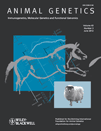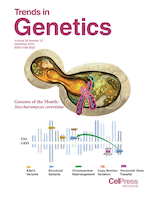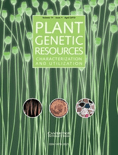
SILVAE GENETICA
metrics 2024
Transforming forestry practices with genetic knowledge.
Introduction
SILVAE GENETICA is a dedicated academic journal in the field of forestry and genetics, published by SCIENDO. Based in Germany, this journal has been a key platform for advancing knowledge in tree genetics and management since its inception. The journal has demonstrated its commitment to quality research with its categorization in the Q3 quartile for Forestry and Q4 for Genetics as of 2023, indicating its relevance and contribution to the respective fields. With an ISSN of 0037-5349 and an E-ISSN of 2509-8934, SILVAE GENETICA covers a diverse range of topics related to the genetic analysis and improvement of forests, employing innovative techniques beneficial for both researchers and practitioners. The journal is indexed within Scopus, ranking #76 in its category for Agricultural and Biological Sciences and #281 for Genetics. While it does not offer Open Access, the importance of the journal's contributions to forestry science and genetic studies cannot be overstated, making it an essential resource for researchers, professionals, and students alike.
Metrics 2024
 0.25
0.25 1.10
1.10 0.90
0.90 43
43Metrics History
Rank 2024
Scopus
IF (Web Of Science)
JCI (Web Of Science)
Quartile History
Similar Journals

ANIMAL GENETICS
Innovating Research for a Sustainable Animal FutureANIMAL GENETICS, published by WILEY, is a leading journal in the fields of Animal Science and Zoology, with a commendable Q1 classification for 2023, reflecting its critical role in advancing research and knowledge in animal genetics. Established in 1986, this journal has become a cornerstone for professionals, researchers, and students alike, providing a platform for innovative research that explores the genetic underpinnings of animal biology. With an ISSN of 0268-9146 and an E-ISSN of 1365-2052, it boasts a significant impact in both agricultural and biological sciences, as indicated by its ranking of #74 out of 490 in its category on Scopus, positioning it in the 85th percentile for Animal Science and Zoology. Readers can access high-quality, peer-reviewed articles that not only illuminate current advancements but also foster future research directions. While currently not an open access journal, ANIMAL GENETICS remains vital for anyone engaged in the exploration of genetics and its applications in medicine and beyond, with a continual commitment to publishing findings that shape the future of animal breeding, conservation, and genetics research.

TRENDS IN GENETICS
Shaping Tomorrow's Genetic Discoveries TodayTRENDS IN GENETICS, published by CELL PRESS, is a leading journal in the field of genetics, recognized for its significant impact on research and advancements in the discipline. With an impressive Scopus ranking of #10 out of 347 in the category of Genetics and a 97th percentile ranking, this journal stands as a premier platform for publishing innovative, high-quality articles that shape the future of genetic research. Since its inception in 1985, TRENDS IN GENETICS has been at the forefront of the genetic sciences, continuously disseminating crucial findings while maintaining a strong commitment to scientific rigor and integrity. Although it does not currently offer open access options, its rigorous peer-review process ensures that only the most relevant and groundbreaking studies make it to publication. Scholars and practitioners in genetics will find this journal to be an invaluable resource for keeping abreast of the latest developments, trends, and methodologies that drive the field forward.

Plant Genetic Resources-Characterization and Utilization
Decoding Genetic Resources for Enhanced Crop ResiliencePlant Genetic Resources-Characterization and Utilization, published by Cambridge University Press, is an esteemed journal in the field of plant science, particularly focusing on the genetic resources crucial for agriculture and crop improvement. With an ISSN of 1479-2621 and an E-ISSN of 1479-263X, this journal serves as a vital platform for researchers aiming to advance the understanding of genetic variation and its applications in plant breeding and conservation. The journal boasts an impressive positioning within its categories, achieving Q2 in Agronomy and Crop Science, Q4 in Genetics, and Q3 in Plant Science as of 2023, which reflects its commitment to publishing high-quality research. Although primarily subscription-based, the journal is accessible to institutions and individuals seeking to stay at the forefront of innovations in plant genetic resources. Researchers, professionals, and students alike will find valuable insights into the latest methodologies, findings, and implications for sustainable agriculture and ecosystem management in its pages. As a key resource for advancing knowledge and practical applications in its field, Plant Genetic Resources-Characterization and Utilization continues to significantly contribute to the scientific community and the understanding of plant biodiversity.

GENETIC RESOURCES AND CROP EVOLUTION
Bridging Genetics and Ecology for Enhanced Crop ResilienceGENETIC RESOURCES AND CROP EVOLUTION is a leading academic journal dedicated to the exploration and advancement of genetic resources in agriculture, evolutionary biology, and plant science. Published by Springer in the Netherlands since 1992, this journal aims to foster a greater understanding of the genetic basis of crop evolution and diversity. With a robust impact reflected in its Q2 status in multiple categories, including Agronomy, Ecology, and Plant Science, it ranks impressively within the top quartiles of its fields. As of 2023, it continues to be an essential resource for researchers, professionals, and students who seek to enhance sustainable crop production and biodiversity conservation through innovative genetic methodologies. The journal promotes high-quality, peer-reviewed research that contributes valuable insights into the genetic adaptation of crops in response to environmental changes. While the journal is not open access, its esteemed reputation ensures that the insights it provides reach a wide audience eager to address some of today's most pressing agricultural challenges.

MOLECULAR BREEDING
Elevating Science with Cutting-Edge Genetic ResearchMOLECULAR BREEDING is a prestigious journal published by Springer, dedicated to advancing the field of agronomy, plant science, and biotechnology through innovative research contributions. With an impressive ISSN of 1380-3743 and E-ISSN 1572-9788, this journal has continuously served the scientific community since its inception in 1995. Operating from the Netherlands, MOLECULAR BREEDING is recognized for its high impact factor and status in the Q1 quartile for both Agronomy and Crop Science and Plant Science in the latest 2023 metrics, highlighting its influential role in these domains. With strong Scopus rankings reflecting its position within the top percentiles of various related fields—including a notable 81st percentile in Plant Science—this journal is essential for researchers, professionals, and students striving to understand and innovate in molecular genetics and breeding techniques. Although it does not provide open access, its rigorous peer-review process ensures that published articles maintain the highest standards and contribute significantly to the scientific discourse. The journal’s diverse scope encompasses significant advancements in molecular biology and genetics, ultimately supporting the global objectives of sustainable agriculture and enhanced crop resilience.

TREES-STRUCTURE AND FUNCTION
Advancing tree science for a sustainable future.TREES - STRUCTURE AND FUNCTION, published by Springer Heidelberg, is a leading journal dedicated to advancing the scientific understanding of tree biology through rigorous research and interdisciplinary approaches. With an impressive impact factor reflecting its high visibility in the scholarly community, this journal specializes in various aspects of tree ecology, physiology, and structure, making it a vital resource for researchers, professionals, and students engaged in forestry and environmental sciences. The journal holds notable rankings, placing it in the top quartiles of several categories, including Q1 in Forestry and Q2 in Ecology as of 2023, underscoring its relevance and influence in the field. Although it is not an open-access journal, TREES strives to disseminate critically important findings that contribute to our understanding of global forest ecosystems and their role in climate change mitigation. With a publication history spanning from 1986 to 2024, this journal continues to shape the future of tree research, providing a platform for innovative studies that inform policy, conservation, and sustainable practices.

Vavilovskii Zhurnal Genetiki i Selektsii
Unlocking Innovations in Agricultural and Biological SciencesVavilovskii Zhurnal Genetiki i Selektsii, with ISSN 2500-0462 and E-ISSN 2500-3259, is a distinguished open-access journal published by the Russian Academy of Sciences, Institute of Cytology and Genetics. Since transitioning to open access in 2013, the journal has been dedicated to advancing research and discourse in the fields of genetics and selection, particularly within agricultural and biological sciences. With a current ranking of Q2 in Agricultural and Biological Sciences and Q3 in Biochemistry, Genetics and Molecular Biology according to Scopus, it serves as a pivotal platform for researchers, professionals, and students to disseminate their findings and collaborate on innovative ideas. The journal, housed in the vibrant academic environment of Novosibirsk, Russia, publishes a diverse range of articles that contribute to the ongoing evolution of genetic studies and practical applications in agriculture. Its commitment to quality and accessibility ensures it plays an essential role in the global scientific community, fostering knowledge that bridges theoretical research and practical implementation.

Conservation Genetics Resources
Empowering Biodiversity through Genetic InsightsConservation Genetics Resources, published by SPRINGER in Germany, is a key resource in the field of conservation science, focusing on the genetic aspects essential for biodiversity preservation and ecosystem management. With an ISSN of 1877-7252 and an E-ISSN of 1877-7260, this journal has established its presence as a vital platform for disseminating high-quality research that addresses the challenges of genetic conservation strategies. Notably, it has demonstrated a strong academic impact, currently holding a Q3 ranking in Ecology, Evolution, Behavior and Systematics and Q4 in Genetics for 2023, alongside Scopus ranks that position it as a notable contributor in its fields. This journal invites contributions that enhance the understanding of genetic diversity, population genetics, and conservation genomics, and it serves as an essential reference for researchers, professionals, and students committed to the preservation of our natural heritage. The access options are varied, catering to the needs of its diverse readership, and making it an indispensable addition to academic research spaces.

Crop Breeding and Applied Biotechnology
Bridging science and practice for a greener tomorrow.Crop Breeding and Applied Biotechnology is a prominent open-access journal published by the Brazilian Society of Plant Breeding that has been dedicated to advancing research in the fields of Agronomy, Crop Science, and Biotechnology since its inception in 2001. With an ISSN of 1984-7033 and an E-ISSN of 1518-7853, this journal is widely recognized within the academic community, evidenced by its Q2 ranking in Agronomy and Crop Science and Q3 ranking in Biotechnology for 2023. The journal serves as a vital platform for researchers, professionals, and students, facilitating the exchange of innovative ideas and studies in crop breeding techniques, genetic improvements, and applied biotechnological advancements. Housed at the Federal University of Viçosa, Brazil, it not only enhances global collaboration among scientists but also contributes to the sustainable development of agricultural practices. As a peer-reviewed journal with a significant indexing presence, it ensures high visibility and accessibility of quality research to the global scientific community.

RUSSIAN JOURNAL OF GENETICS
Illuminating Pathways in Genetic ResearchRUSSIAN JOURNAL OF GENETICS is a significant platform in the field of genetics, published by PLEIADES PUBLISHING INC since its inception in 1996. With an ISSN of 1022-7954 and an E-ISSN of 1608-3369, the journal focuses on a wide array of topics within genetics, providing researchers, professionals, and students with insights into advancements and discoveries in this ever-evolving discipline. While it currently holds a Q4 ranking in the 2023 Genetics category according to Scopus, representing invaluable opportunities for knowledge dissemination, the journal is actively working to enhance its impact in future rankings. Readers will find the journal a repository of diverse genetic research findings, methodologies, and theoretical advancements. Although it is not an open-access journal, it is committed to serving the academic community through rigorous peer-reviewed articles. With a consistent publication trajectory spanning to 2024, the RUSSIAN JOURNAL OF GENETICS remains a crucial resource for those aspiring to stay at the forefront of genetic research and applications.